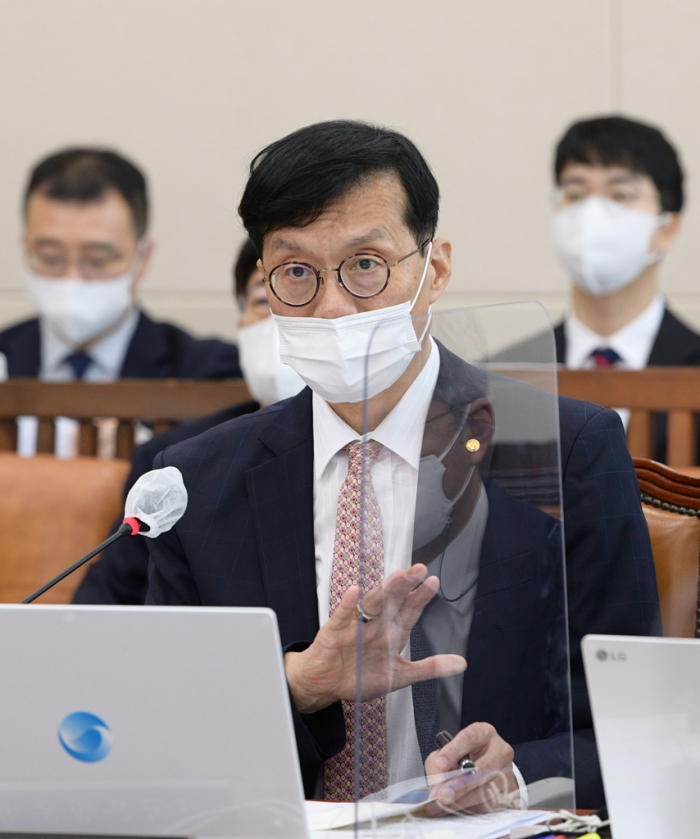Foreign exchange
Korean won at fresh low since global financial crisis as markets crash
Kospi, Kosdaq hit lowest points since mid-2020; Korea's govt bond yields highest in more than a decade
By Sep 26, 2022 (Gmt+09:00)
2
Min read
Most Read
LG Chem to sell water filter business to Glenwood PE for $692 million


Kyobo Life poised to buy Japan’s SBI Group-owned savings bank


KT&G eyes overseas M&A after rejecting activist fund's offer


StockX in merger talks with Naver’s online reseller Kream


Mirae Asset to be named Korea Post’s core real estate fund operator



The South Korean won on Monday extended losses to a fresh low since the 2008-09 financial crisis as local financial markets lost ground, alongside their overseas peers, on growing concerns that aggressive interest rate hikes worldwide signal the increasing likelihood of a global recession.
The government bond yields also touched their highest levels in more than a decade as Bank of Korea Governor Rhee Chang-yong continued to indicate another 50-basis-point interest rate hike next month, given sustained inflationary pressure in Asia’s fourth largest economy.
The won lost as much as 1.8% to 1,435.4 per dollar, its weakest since March 16, 2009, before closing the local trade at 1,431.3 with the foreign exchange authorities suspected of selling dollars.
Domestic stock markets also tumbled. The main Kospi ended down 3.02% at 2,220.94, the lowest finish since July 27, 2020, while the junior Kosdaq dropped 5.07%. Their regional peers skidded with the Nikkei 225 in Japan down 2.66% and the Shanghai Composite in China down 1.2%, respectively.
Investor sentiment, which has already been soured by the US Federal Reserve’s determination to aggressively raise interest rates, was dampened further as the UK announced a sweeping series of tax cuts, boosting fears of inflation, which could prompt the Bank of England to tighten its monetary policy.
The British pound tanked to a 37-year low, while the euro slumped 1.5%.
“The UK government’s various tax cuts to boost economic growth bolstered worries about inflation and debts, hurting the pound and euro,” said Moon Hong-cheol, an economist at DB Financial Investment in Seoul.
KOREAN GOVERNMENT BOND YIELDS SURGE
South Korea’s government bond yields soared as BOK Governor Rhee reiterated a signal of another 50-bp rate hike.
The most liquid three-year treasury bond yield rose 34.9 bps to 4.548%, the highest since October 2009, while the five-year bond yield also grew 37 bps to 4.563%, the strongest since March 2010, according to the Korea Financial Investment Association.
“BOK Rhee’s signal on another big step after the Fed’s latest meeting dented investor sentiment,” said a local bond market participant.

Rhee said South Korea’s inflation may peak later than earlier expectations.
“We still expect inflation to peak in October but the forecast could change due to energy prices and foreign exchange rates,” he told lawmakers, although he declined to comment when asked if the central bank will raise the base interest rate by 50 bps next month.
“Oil prices are falling faster than predicted, but a weaker won offset the impact. It is possible for inflation to very slowly ease.”
Last week, Rhee said the precondition for the central bank’s earlier plan for 25-bp rate hikes has changed after the Fed’s sustained aggressive stance after a 75-bp increase in the federal funds rate.
The BOK in July delivered its first-ever 50-bp rate hike.
(Updated with markets, BOK Governor, analyst, new photos)
Write to Mi-Hyun Cho, Eunji Cha and Sung-Mi Shim at mwise@hankyung.com
Jongwoo Cheon edited this article.
More to Read
-
 Central bankBOK chief signals another big step as Fed hike haunts won
Central bankBOK chief signals another big step as Fed hike haunts wonSep 22, 2022 (Gmt+09:00)
5 Min read -
 Central bankBOK delivers fourth straight rate hike as inflation persists
Central bankBOK delivers fourth straight rate hike as inflation persistsAug 25, 2022 (Gmt+09:00)
3 Min read
Comment 0
LOG IN


